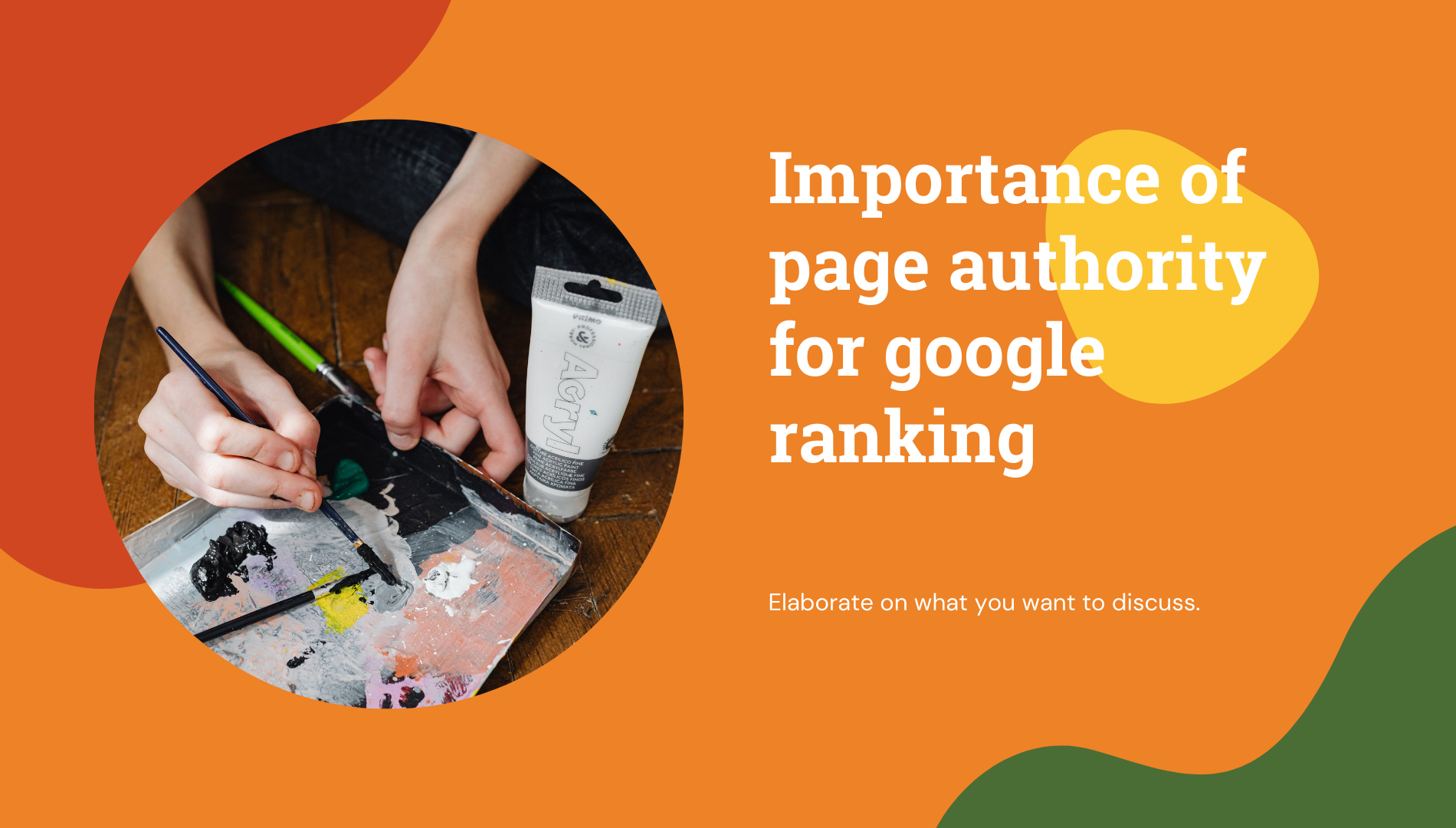
Importance of page authority for google ranking in 2024
Importance of page authority for google ranking
Introduction:
In the dynamic landscape of digital marketing, achieving a high Google ranking is the Holy Grail for businesses and content creators. The digital sphere’s competitiveness has made it imperative to understand and leverage various factors that influence search engine rankings. Among these, page authority stands out as a crucial determinant that can significantly impact your website’s visibility on Google’s search results.
Understanding Page Authority:
Page authority is a metric developed by Moz that predicts a web page’s likelihood to google ranking on search engine result pages (SERPs). It is based on a scale from 0 to 100, with higher scores indicating a greater ability to rank. Several factors contribute to page authority, including the quality and quantity of inbound links, the relevance of content, and overall user experience.
The Role of Page Authority in Google Ranking:
- Influence on Search Engine Algorithms:
- Building Trust and Credibility:
- Enhanced Visibility:
- Link Building and Off-Page SEO:Link building and off-page SEO are crucial components of a comprehensive search engine optimization strategy. These practices focus on enhancing a website’s authority, credibility, and visibility through external signals, particularly through the acquisition of high-quality backlinks from reputable sources. Here are the details on link building and off-page SEO:
- Link Quality Over Quantity: Prioritize the quality of backlinks over their quantity. High-quality, authoritative links from relevant and reputable websites carry more weight in search engine algorithms. Avoid engaging in practices that may lead to the acquisition of low-quality or spammy links.
- Natural Link Building: Aim for natural link building, where links are earned organically through the creation of valuable and shareable content. When others find your content valuable, they are more likely to link to it. This can be achieved through informative blog posts, research studies, infographics, and other compelling content.
- Relevance of Linking Domains: Ensure that the websites linking to yours are relevant to your industry or niche. Links from contextually relevant sources carry more weight in search engine algorithms. For example, if you run a fitness blog, a link from a reputable fitness equipment website is more valuable than a link from an unrelated source.
- Diverse Link Profile: Build a diverse link profile by obtaining links from various types of sources. This includes industry-specific directories, authoritative blogs, news websites, and social media platforms. A diverse link profile appears more natural to search engines and can contribute to improved rankings.
- Anchor Text Optimization: Optimize anchor text, the clickable text in a hyperlink, for relevance and diversity. Avoid over-optimizing with exact-match anchor texts, as this may raise red flags with search engines. Use a mix of branded, generic, and relevant anchor texts for a more natural link profile.
- Social Media Signals: While social media links are often “nofollow” (meaning they don’t directly contribute to SEO), they can still have an indirect impact on off-page SEO. Social media signals, such as shares and likes, can increase your content’s visibility and potentially lead to more backlinks from other websites.
- Guest Posting: Contribute high-quality guest posts to authoritative websites in your industry. Guest posting not only allows you to showcase your expertise but also provides an opportunity to include relevant links back to your own content. Ensure that guest posting is done ethically and contributes value to the host site’s audience.
- Broken Link Building: Identify broken links on authoritative websites within your niche and reach out to suggest your content as a replacement. This tactic can help you secure valuable backlinks while assisting webmasters in maintaining a functional and relevant resource.
- Influencer Partnerships: Collaborate with influencers and thought leaders in your industry. Influencers often have significant online reach, and a mention or link from them can significantly boost your website’s visibility and credibility.
- Brand Mentions: Monitor online mentions of your brand, products, or services. Reach out to websites or publications that mention you but haven’t linked to your site, requesting a link. This helps in turning unlinked brand mentions into valuable backlinks.
- Competitor Analysis: Analyze the backlink profiles of your competitors to identify potential link-building opportunities. If a website has linked to your competitor, there’s a chance they may be interested in linking to your content as well.
- Local Citations and Directories: Ensure that your business is listed accurately on local directories and citation websites. Local citations can contribute to improved local search visibility, especially for businesses with physical locations.
- User Experience and Engagement: User experience (UX) and engagement are critical elements in the success of a website, not only for retaining visitors but also for influencing search engine rankings. Search engines, particularly Google, consider user signals when determining the relevance and quality of a webpage. Here are the details on how to optimize user experience and engagement:
- Responsive Design: Ensure that your website is responsive and provides a seamless experience across various devices, including desktops, tablets, and smartphones. A responsive design enhances accessibility and usability for a broader audience.
- Page Loading Speed: Optimize page loading speed to keep users engaged. Slow-loading pages can lead to high bounce rates. Compress images, use browser caching, and leverage content delivery networks (CDNs) to improve loading times.
- Intuitive Navigation: Design an intuitive and user-friendly navigation structure. Visitors should easily find the information they are looking for. Clear menus, logical categories, and a well-organized layout contribute to a positive user experience.
- Clear Call-to-Action (CTA): Use clear and compelling calls-to-action throughout your website. Whether it’s prompting users to sign up for a newsletter, make a purchase, or contact you, a well-designed CTA guides users toward desired actions.
- Quality Content: Provide high-quality, relevant, and valuable content that meets the needs of your target audience. Well-researched and authoritative content not only keeps users engaged but also contributes to improved search engine rankings.
- Readability and Formatting: Format your content for easy readability. Use short paragraphs, headings, bullet points, and white space to break up text. A well-formatted page makes it easier for users to scan and understand the content.
- Multimedia Integration: Incorporate engaging multimedia elements, such as images, videos, and infographics, to enhance the overall user experience. Visual content can convey information more effectively and keep users interested.
- Interactive Elements: Implement interactive elements on your website, such as quizzes, surveys, or interactive forms. Interactive content encourages user participation and can increase time spent on your site.
- Personalization: Tailor the user experience based on individual preferences when possible. Personalization can include recommending related content, providing personalized product recommendations, or allowing users to customize their settings.
- Mobile Optimization: Given the increasing number of mobile users, optimize your website for mobile devices. Google prioritizes mobile-friendly websites in its rankings, and a positive mobile experience contributes to better SEO performance.
- Feedback and Reviews: Encourage user feedback and reviews. Positive reviews build trust, and constructive feedback can help you identify areas for improvement. Displaying testimonials and reviews prominently can enhance your website’s credibility.
- Minimize Intrusive Pop-Ups: While pop-ups can be effective for certain purposes, ensure they are not overly intrusive. Google penalizes websites with intrusive interstitials, especially on mobile devices, as they can disrupt the user experience.
- Social Media Integration: Integrate social media buttons and sharing options to encourage users to share your content. Social engagement can contribute to increased visibility and traffic.
- Regularly Update Content: Keep your website content fresh and up-to-date. Regular updates signal to search engines that your site is active and relevant. Additionally, returning visitors are more likely to engage with new content.
- Accessibility: Ensure that your website is accessible to users with disabilities. This includes providing alternative text for images, using descriptive link text, and following best practices for web accessibility standards.
Optimizing Page Authority for Improved Google Ranking:
- Quality Content Creation: Develop informative, relevant, and engaging content that addresses user queries and provides value. Quality content attracts natural backlinks and enhances overall page authority.
- Strategic Link Building: Focus on acquiring high-quality backlinks from reputable websites within your niche. Build a diverse link profile to strengthen your page authority.
- On-Page SEO: Optimize your on-page elements, including meta titles, meta descriptions, headers, and image alt text. Ensuring that your content is well-structured and easily understandable by search engines contributes to higher page authority.
- User-Friendly Design: Improve the overall user experience by having a responsive design, fast loading times, and an intuitive navigation structure. Positive user experiences contribute to higher page authority.
Conclusion:
In the ever-evolving realm of SEO, understanding and prioritizing page authority is paramount for achieving a coveted spot on Google’s search rankings. By consistently producing valuable content, fostering strategic link-building efforts, and optimizing on-page elements, you can enhance your page authority and, consequently, improve your Google ranking. Stay attuned to the evolving SEO landscape, and let the power of page authority propel your online presence to new heights.

